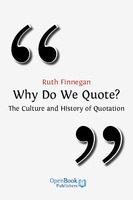Why Do We Quote?
The Culture and History of Quotation
Author(s)
Finnegan, Ruth
Collection
ScholarLedLanguage
EnglishAbstract
Quoting is all around us. But do we really know what it means? How do people actually quote today, and how did our present systems come about? This book brings together a down-to-earth account of contemporary quoting with an examination of the comparative and historical background that lies behind it and the characteristic way that quoting links past and present, the far and the near. Drawing from anthropology, cultural history, folklore, cultural studies, sociolinguistics, literary studies and the ethnography of speaking, Ruth Finnegan’s fascinating study sets our present conventions into cross-cultural and historical perspective. She traces the curious history of quotation marks, examines the long tradition of quotation collections with their remarkable recycling across the centuries, and explores the uses of quotation in literary, visual and oral traditions. The book tracks the changing definitions and control of quoting over the millennia and in doing so throws new light on ideas such as 'imitation', 'allusion', 'authorship', 'originality' and 'plagiarism'.
Keywords
cultural anthropology; imitation; oral traditions; quotation; cultural history; folklore; quotation marks; english; plagiarism; language; quoting; sociolinguistics; originality; oral literature; Erasmus; LatinDOI
10.11647/OBP.0012ISBN
9781906924331OCN
741648010Publisher
Open Book PublishersPublisher website
https://www.openbookpublishers.com/Publication date and place
2011Classification
Language: reference and general
Social and cultural anthropology


 Download
Download Web Shop
Web Shop